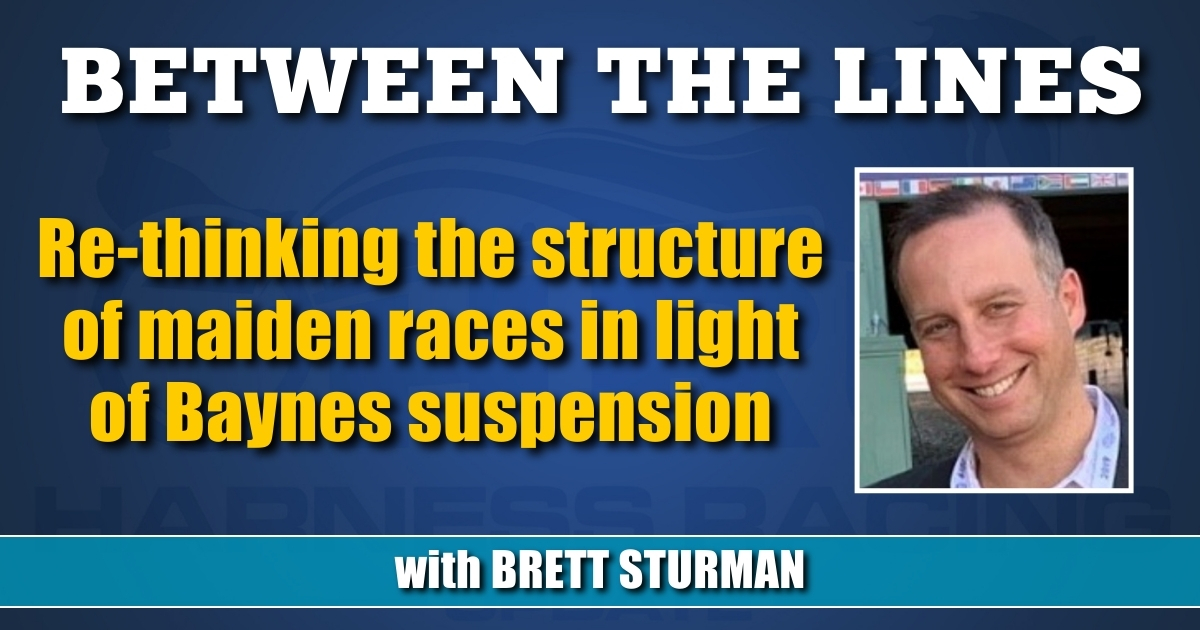

Re-thinking the structure of maiden races in light of Baynes suspension
by Brett Sturman
In this week’s USTA Fines and Suspensions published on Friday (June 28), driver and trainer Ray Baynes was levied with an unusually large penalty ($5,000 fine and 180 days), stemming from a recent drive at Harrah’s Philadelphia two weeks ago in which judges deemed the drive as “conduct detrimental to the best interest of racing.”
In the third race from June 13 at Philly, Baynes and his horse Brickyard Rally, sent off at odds of 7-2 and racing in a nw1PM trot for $10,500, left from the outside post and were able to settle into the third position. At three-quarters, he was able to gain clearance to the outside, trotted up nicely to close and move past the race leader in the stretch, only to be caught in the final stride by a surging longshot.
Judges ruled that Baynes, “did not put forth his best effort to win by failing to drive his horse at the finish.” Upon review of the replay, it does seem, at least visually, that there was a lack of driver encouragement as Brickyard Rally approached the finish. On the other hand, I’ve seen much worse. Two of which come to mind from Delaware over 10 years ago when in separate incidents drivers were given lesser penalties for drives that would have resulted in lifetime bans if I were running things. Not to mention the near daily occurrence of horses driven with less-than-optimal efforts with not a word said.
As for this incident, was there a decided effort to intentionally finish second in the maiden-level race, or was Baynes doing what he could do to keep his 5-year-old maiden gelding trotting nearing the finish? I honestly can’t say. The judge’s ruling also stated that “aggravating factors” were considered in determining this penalty. It doesn’t state what those aggravating factors are, but my guess is that the judges didn’t look kindly on the fact that Brickyard Rally has raced nearly all year in the nw1PM condition, and this race was his opportunity to move out of it.
If there’s the implication of a horse not winning in order to stay in the same class, it’s where these maiden and non-winners of one or two races almost always occur. Whether by design or not, Brickyard Rally has now made $25,594 this year for his work in the nw1PM condition. After four races to start the year in lower-rated classes at Freehold, he has raced literally every single week at Harrah’s Philadelphia from April 14 to now, and he’s in to go this upcoming week, all while racing for $10,500 against fellow maidens. In the process, he’s only finished out of the money twice and his record for the year stands at eight seconds and six thirds from 16 starts.
I’m not sure if what’s led to this suspension is an indictment of the horse or on the system.
The situation reminded me of a conversation I had prior with longtime owner and breeder, Eric Cherry, who I have cited here before. Never short on ideas, Cherry has long felt that maiden races should be in the form of winner-take-all. The winner of the race gets 100 per cent of the purse.
On the surface, I could see how it may seem like a radical idea but it would actually serve a couple of different purposes. There’s been discussion in the past that the purses of maiden and other races for younger horses should be increased as a way to help horses as they begin their career, allowing owners to get earlier and higher purse returns on their yearling purchases. What could be a better way to help kick-start that process than to provide the full purse of a race to the winning horsemen? I’d imagine it would help yearling sales in the same process. It would be enticing to buy a relatively inexpensive yearling for $10,000 if you knew all of it could be earned back with a single maiden win.
But secondly, it would completely destroy any incentive to want to remain in the same class. You either have to win the race or you don’t earn anything. Any notion of milking the same class would be eliminated and imagine what it would do to the aggressiveness of the race.
Or, as an alternative, what if there were a condition that stipulates how long a horse can stay in a nw1 or nw2 race? It could be indefinite for a horse that isn’t competitive, but there could certainly be a rule that states after let’s say three second-place finishes in the last five races, you have to move up a class for a period of time before you can move back down.
Each of these options could be used as ways to keep getting horses moving through the nw1 conditions faster, and help replace mainstays in the condition with newer, fresh horses.
At absolute minimum, they would have helped to cast lesser doubt on what went into the Baynes situation. More than that, it would help improve the quality and integrity of the racing product and the introductory conditions for younger horses.















